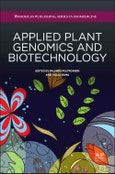Applied plant genomics and biotechnology reviews the recent advancements in the post-genomic era, discussing how different varieties respond to abiotic and biotic stresses, investigating epigenetic modifications and epigenetic memory through analysis of DNA methylation states, applicative uses of RNA silencing and RNA interference in plant physiology and in experimental transgenics, and plants modified to produce high-value pharmaceutical proteins. The book provides an overview of research advances in application of RNA silencing and RNA interference, through Virus-based transient gene expression systems, Virus induced gene complementation (VIGC), Virus induced gene silencing (Sir VIGS, Mr VIGS) Virus-based microRNA silencing (VbMS) and Virus-based RNA mobility assays (VRMA); RNA based vaccines and expression of virus proteins or RNA, and virus-like particles in plants, the potential of virus vaccines and therapeutics, and exploring plants as factories for useful products and pharmaceuticals are topics wholly deepened. The book reviews and discuss Plant Functional Genomic studies discussing the technologies supporting the genetic improvement of plants and the production of plant varieties more resistant to biotic and abiotic stresses. Several important crops are analysed providing a glimpse on the most up-to-date methods and topics of investigation. The book presents a review on current state of GMO, the cisgenesis-derived plants and novel plant products devoid of transgene elements, discuss their regulation and the production of desired traits such as resistance to viruses and disease also in fruit trees and wood trees with long vegetative periods. Several chapters cover aspects of plant physiology related to plant improvement: cytokinin metabolism and hormone signaling pathways are discussed in barley; PARP-domain proteins involved in Stress-Induced Morphogenetic Response, regulation of NAD signaling and ROS dependent synthesis of anthocyanins. Apple allergen isoforms and the various content in different varieties are discussed and approaches to reduce their presence. Euphorbiaceae, castor bean, cassava and Jathropa are discussed at genomic structure, their diseases and viruses, and methods of transformation. Rice genomics and agricultural traits are discussed, and biotechnology for engineering and improve rice varieties. Mango topics are presented with an overview of molecular methods for variety differentiation, and aspects of fruit improvement by traditional and biotechnology methods. Oilseed rape is presented, discussing the genetic diversity, quality traits, genetic maps, genomic selection and comparative genomics for improvement of varieties. Tomato studies are presented, with an overview on the knowledge of the regulatory networks involved in flowering, methods applied to study the tomato genome-wide DNA methylation, its regulation by small RNAs, microRNA-dependent control of transcription factors expression, the development and ripening processes in tomato, genomic studies and fruit modelling to establish fleshy fruit traits of interest; the gene reprogramming during fruit ripening, and the ethylene dependent and independent DNA methylation changes.
Please Note: This is an On Demand product, delivery may take up to 11 working days after payment has been received.
Table of Contents
- Biotech plants for Molecular farming of high-value therapeutics (Maltase, Antibodies, and glycosylated proteins) and experimental work done at Syncura Inc., Italy.
- GrainLegumes: legume functional genomics and applications (common bean, pea, faba bean)
- Plant viruses and their application for plant studies.
- Viral induction and suppression of RNA silencing in plants.
- Engineering the RNA silencing pathways to improve plant resistance.
- Cross-talk between hormones and Plant Growth Regulators: mechanisms and pathways to improve stress tolerance.
- Cereal crops: from genetic diversity to reinforcing pathways and mechanisms of abiotic stress tolerance.
- Cisgenesis: genetic modification approach and advantages in respect to transgenic organisms.
- Phyto-bioremediation and phytochelatin overexpressing plants.
- Genetically modified wood trees. Chestnut germplasm modified for improved resistance to cold and heat. Eucalypt varieties with optimized pulp for cellulose industry.








